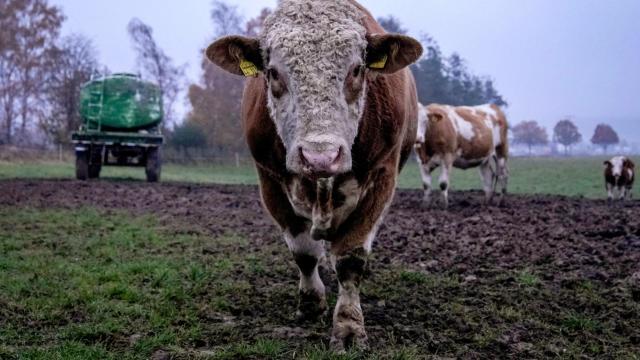At United Nations climate talks, the U.S. and EU rolled out a global pledge to address one of our most pressing climate problems: methane. Since the Tuesday announcement, more than 100 countries have now said they’re join the pledge. But a few key actors are sitting out of the pledge — and one, in particular, is throwing its weight behind a polluting industry.
Methane is one of the lowest-hanging fruits in the climate conversation. It spends far less time in the atmosphere than carbon dioxide but is 80 times as potent. Emissions are on the rise, which is a big problem we can’t afford to have right now when the world needs to rapidly wind down all greenhouse gas pollution.
Methane come from a couple of different places, most notably from agriculture and oil and gas production. Thankfully, we have the technology and know-how to fix a lot of the issues that have led to the ballooning methane problem. The pledge, accordingly, is pretty straightforward: Commit to helping reduce global methane emissions 30% by 2030. The pledge is notably non-binding.
Yet several heavy-hitting polluters are, at least for now, sitting out committing. China, Russia, India, Australia, and Iran are some of the biggest countries that are the did-not-sign list. China, India, and Russia are the top three methane-emitting countries in the world, and their absence is particularly noticeable. Presidents Vladimir Putin and Xi Jinping of Russia and China, respectively, aren’t even at COP this year, so they’re not exactly jonesing to show off their climate cred for all their world leader buddies.
Some organisers say they see these holdouts not as a sign of failure for the pledge, but rather as a symbol of how new this whole idea is in the first place. The Intergovernmental Panel on Climate Change report released earlier this year included methane as a top climate priority for the first time ever, while the whole idea of a global pledge was only announced in September.
“This [pledge] has had a very short life up to this point,” said Jonathan Banks, who works on super pollutants with the Clean Air Task Force. “It’s easier for countries that don’t have much in the way of [methane] emissions to join this. It is a different kind of effort that will be needed for a country like India or China or Russia to tackle this problem. The short timespan we’ve had to get [these countries] comfortable with this hasn’t quite been enough.”
Banks said that some of the big emitters, like Russia and China, have been sending “really good signals” about cutting methane emissions. It also attracted Brazil, the world’s fifth-largest methane producer that also happens to be led by a racist climate denier, to sign on. The holdout countries also have different profiles in terms of where emissions come from in their countries, so may have different considerations to make: Russia is the largest source of methane emissions from the oil and gas industry in the world while both China and India’s sources of methane are more varied.
But at least one country from this list of laggards has come right out and said it’s more interested in propping up an industry that’s responsible for churning out methane than joining the pledge to cut emissions. Australian leaders have made no bones about their support for the cattle industry, which they said is why they declined to sign on to the pledge.
“The only way you can get your 30% by 2030 reduction in methane on 2020 levels would be to grab a rifle and go out and start shooting your cattle,” National Party leader Barnaby Joyce told reporters.
It should be noted that Australia, despite having a front seat to devastating climate impacts, has a long and checkered history of climate denial; the country only just made a net zero announcement late last week, and Prime Minister Scott Morrison had to basically be dragged to this year’s UN talks. (In a grim joke, the country’s pavilion at the talks is sponsored by Santos, a gas company.)
While many forms of agriculture release methane emissions, cows are an especially potent problem, given that they create methane as part of their natural digestive process. And while the Australian cattle industry (and elsewhere) has continually claimed that it’s part of the climate solution, it has also said it doesn’t want any sorts of policies or targets that would mandate reducing methane (and therefore beef production).
Given Australia’s track record, it seems like the cattle reason may just be an excuse for the country to further drag its heels on climate. The concern for the agriculture industry isn’t keeping other countries that have a lot of cows from committing to cut methane. New Zealand, which has a similarly robust cattle industry, is reportedly considering joining the pledge. The U.S. alone accounts for 19% of the world’s beef production, while Brazil and the EU are second and third.
There are a lot of questions about the efficacy of a non-binding pledge like this, which reports say was intentionally made as easy as possible for big actors to join. It may seem pretty distressing that a simple, bar-on-the-floor proposal still isn’t palatable to some of the world’s biggest emitters. But Banks stressed that there’s still plenty of time to get the world’s top three methane emitters — and maybe some of the other holdouts too — on board.
“The pledge isn’t what gets the methane reductions — it’s everything that happens from [the end of COP26] on that gets the methane reductions,” he said. “I am still really hopeful that we will get the engagement on all three of the big holdouts, and I think we will.”
